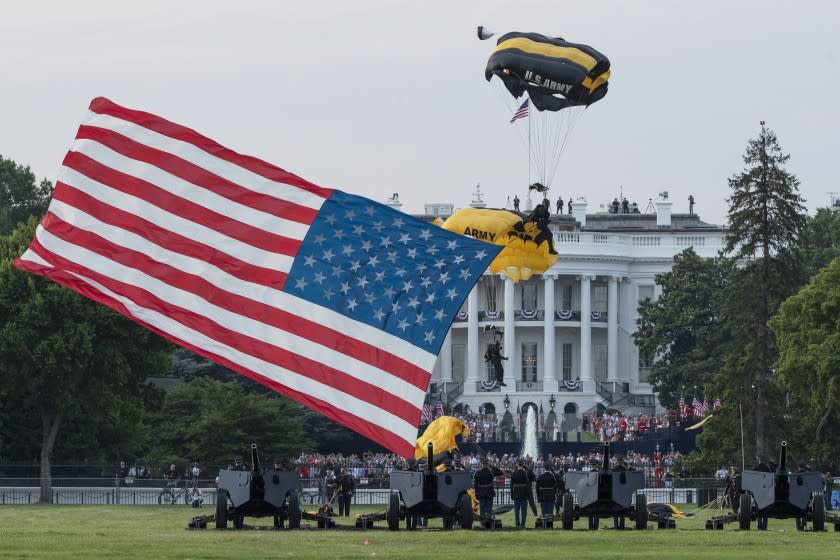Column: Trump makes it clear: There are two Americas, and November is for choosing sides

Looking back on it now, Barack Obama had it all wrong in 2004.
“There is not a liberal America and a conservative America,” the Illinois state senator proclaimed in his keynote speech at the Democratic National Convention. “There is the United States of America!”
How quaintly aspirational that sentiment seems today.
As anyone who has been paying attention can see, there are indeed two Americas.
But to call them “conservative” and “liberal” is to miss the essence of the moment.
There is Donald Trump’s America, a world of white racial resentment where the Confederate flag proudly flew, where monuments to traitors are to be revered, where protesting racial injustice is an intolerable act of aggression, and where a pandemic that has killed at least 133,000 Americans and put millions out of work is a mere inconvenience that people will come to accept.
And then, there is what I like to think of as the real America, a deeply flawed country that is starting to come to grips with the wages of racism, a too-violent police culture, a wealth gap, an education gap, a health insurance gap. A country that believes in its better angels, a country that knows it can do better.
Trump, as many political observers have noted, has decided that his path to reelection will be paved with hatred and racial division. The outpouring of anguish that followed the death of George Floyd at the hands of police in Minneapolis and the subsequent, widespread embrace of the Black Lives Matter movement, has simply given him the foil he requires to rile his base.
Just this week, Trump seemed to demand that NASCAR driver Bubba Wallace, a Black man, take responsibility for a noose that was found in his garage. The FBI had concluded that the noose had been in the garage before it was assigned to Wallace, so its presence could not be construed as a hate crime.
“Has @BubbaWallace apologized to all of those great NASCAR drivers & officials who came to his aid, stood by his side & were willing to sacrifice everything for him, only to find out that the whole thing was just another HOAX?” Trump tweeted.
A few days earlier, Trump declared that painting “Black Lives Matter” on Fifth Avenue next to his namesake New York City tower would amount to a “symbol of hate.”
He has declared that renaming the Washington Redskins and Cleveland Indians is a capitulation to political correctness. But could he just stop there? No, he could not: “Indians, like Elizabeth Warren,” he added, “must be very angry right now!”
And then there were his Independence Day speeches, delivered a day apart, one at the base of Mt. Rushmore and the other on the South Lawn of the White House.
At a time when most presidents applaud the American ideals enshrined in the Declaration of Independence, and often single out the branches of the military for praise, Trump’s words were notable for their divisive tone and ugly rhetoric.
In South Dakota, he warned of “a growing danger that threatens every blessing our ancestors fought so hard for.”
"Our nation," he said, “is witnessing a merciless campaign to wipe out our history, defame our heroes, erase our values and indoctrinate our children.”
He spoke of “a new far-left fascism,” of a “left-wing cultural revolution,” of “angry mobs” who are trying to “unleash a wave of violent crime in our cities,” of “cancel culture” (as if he were not its foremost practitioner), of attacks on “our liberty,” and the need to “preserve our beloved American way of life.”
Back in Washington, he stuck to his theme of pitting Americans against one another: “We are now in the process of defeating the radical left, the Marxists, the anarchists, the agitators, the looters … .”
Trump’s response to America’s genuine outrage at the death of Floyd, and so many other men and women of color, has been so tone deaf and immoral that even James Mattis, the retired Marine general who became Trump’s secretary of Defense until they broke over the president’s Syria policy, could take it no longer.
“Donald Trump is the first president in my lifetime who does not try to unite the American people — does not even pretend to try,” Mattis wrote in a statement published by the Atlantic last month. “Instead, he tries to divide us.”
That judgment was harsh, but it pales next to something else Mattis wrote: “Instructions given by the military departments to our troops before the Normandy invasion reminded soldiers that the Nazi slogan for destroying us ... was 'Divide and Conquer.' Our American answer is 'In Union there is Strength.'"
You understand how extraordinary that is, right? Mattis essentially compared Trump’s values to Adolf Hitler’s.
Over the past few days, in honor of our national holiday, I spent some time in the archives of presidential speeches.
I came across the 1964 speech that made Ronald Reagan, future governor of California, a national political star. It was a full-throated endorsement of Barry Goldwater’s doomed presidential campaign, a cry against big government, the welfare system, and it was pocked with racist dog whistles.
But Reagan did say something that struck me as relevant to the current moment.
“You and I are told increasingly we have to choose between a left or right,” Reagan said. “Well, I’d like to suggest there is no such thing as a left or right. There's only an up or down.”
This November is another time for choosing. Will we go up or let Trump drag us down?
@AbcarianLAT
For the record:
1:34 PM, Jul. 08, 2020: An earlier version of this piece incorrectly stated that Ronald Reagan was governor of California in 1964. He was elected in 1966.

